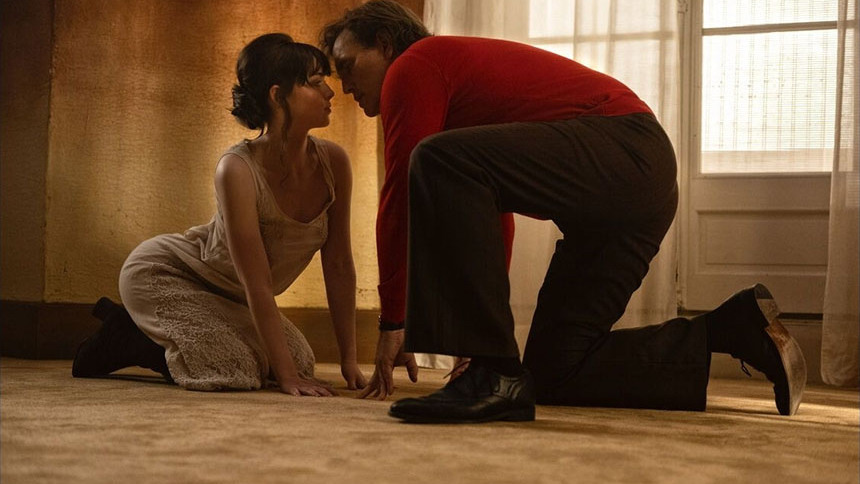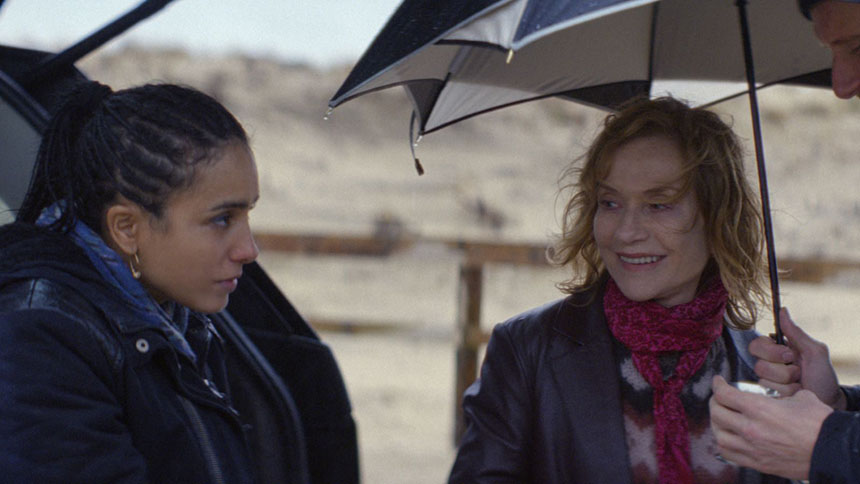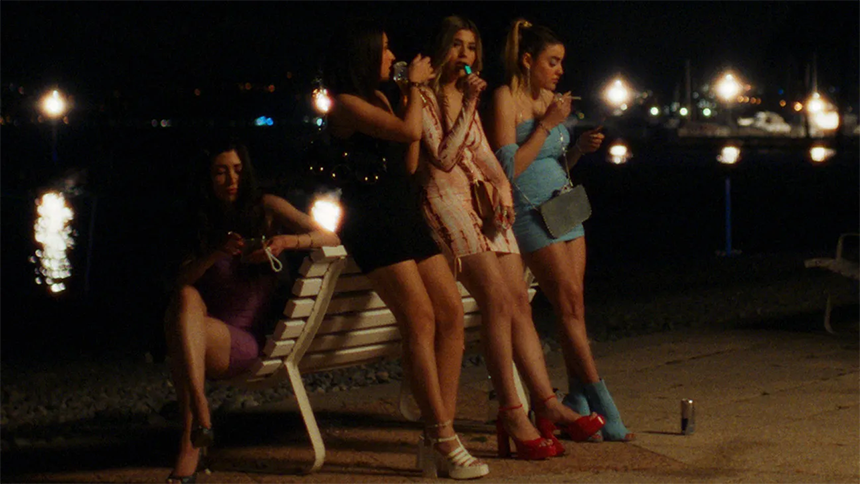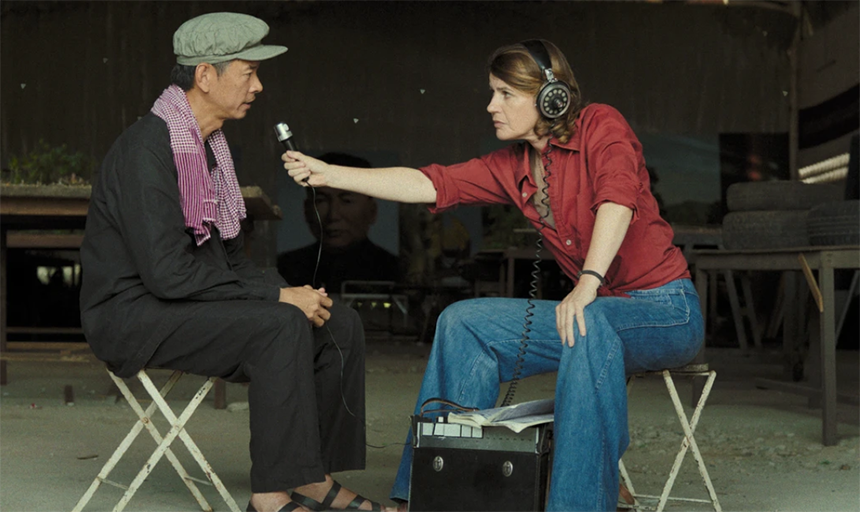
Being Maria - Jessica Palud
As the French film industry's going through a full #MeToo reckoning, Jessica Palud's Being Maria revisits Bernardo Bertolucci's controversial film The Last Tango in Paris, telling the untold story from the perspective of its co-star Maria Schneider and the film's life-long effect on the actress. Schneider, star of many memorable films, such as Michelangelo Antonioni's Passenger, Jacques Rivette's Merry-Go-Round, later became an outspoken activist against sexism in the French film industry.
Anamaria Vartolomei (Happening) plays Schneider, a young, unknown actress chosen by Bertolucci (Giuseppe Marggio), to star opposite Marlon Brando (Matt Dillon) in the sexually charged Last Tango, at age 19. It was the 70s and if you are an established auteur like Bertolucci, it was 'anything goes' for art. The premise of the film is two strangers meeting by chance and carrying out a strictly physical relationship, baring their bodies and souls to each other. There will be a lot of nudity, so it will be controversial, the director warns. But you get to work with Brando and your career will be launched.
Maria knows what she is signing up for. Yet she needs a consent form (because she is underage) signed by her movie-business disapproving mother. But it's the infamous "butter" scene, an improvised simulated sex scene involving butter, that really breaks Maria. After the scene, she felt violated and humiliated by both Bertolucci and Brando, who never told her what their intentions were for the scene beforehand and never apologized. Her shock and tears captured on screen were real.
She is reprimanded by her manager for speaking out about the incident during the press tour after the film's release. Soon afterwards, she becomes a heroin addict and finding herself branded as 'difficult to work with', by refusing to do a nude scene in most of the roles she is offered. She befriends college student Noor (Céleste Brunnquell), who is writing her dissertation on women's roles in films, and the two become involved. And it is Noor who sees Maria through her drug addiction.
It is understandable that Vartolomei was chosen to play Schneider, even though there's no physical resemblance. In Happening, where she plays Anne, a high school student in need of an abortion, which was still illegal in 60s France. With all the conservative swings around the world, her performance became a women's rights symbol. And she does a great job portraying a principled young Schneider, who saw injustices in the French film industry run by men, for men, long before #metoo caught up with it.

Visiting Hours - Patricia Mazuy
Alma (Isabelle Huppert) and Mina (Hafsia Herzi), women from two different backgrounds -- one of privilege and the other, working class -- meet at the family visiting facility of a prison. Both their husbands are incarcerated. Alma, a former dancer, now a bored wife of a neurosurgeon who is serving time for DUI manslaughter, sees Mina in distress and lends a helping hand. She invites Mina and her two young children to stay at her large empty house, so Mina doesn't have to travel 3 hours by bus to visit her husband in prison. This way, Alma doesn't feel so alone by herself.
A friendship blossoms: Mina takes a liking to Alma's directness, biting sense of humor and generosity. It is revealed that Alma's marriage has been on the fritz for a while, even long before the hit-and-run, whereas Mina still has a passionate love for her incarcerated husband, as evidence by tears shed amidst a brief tryst on visits. Mina's husband is in jail for robbing a jewelry store and Yassine, his associate outside, is not liking her new situation, suspecting that she and her husband are stiffing him from some hidden stolen goods.
Things take a turn with the news of Alma's husband's early release and Yassine spying on her. Alma's assessment of her husband's collecting art as an investment gives Mina an idea of a staged break-in where Yassin can take one of the paintings from Alma's house, and leave her and her family alone. Alma wouldn't mind and won't call the cops on her.
Patricia Mazuy's women's empowerment story has similar dynamics with Claude Chabrol's Hitchcockian thrillers. It even starts with Alma shopping for flowers in a visually overloaded flower shop sequence reminiscent of Vertigo. Mazuy is a very competent director and gets great chemistry out of Huppert and Herzi. Visiting Hours may not have the gritty, ultra-violent aspect of her last film, Saturn Bowling, but it's a solid film with great performances and great visuals.

Wild Diamond - Agathe Riedinger
Liane, (Malou Khebizi), 19 years old, lives with her unemployed single mother and a younger sister, lives and dies by her phone, gaining social-media followers with her looks and dance moves. The platitudes of her fans, spreading across the screen, is what she lives for. Her emphasis on her looks -- she got breast enhancement surgery, and self-administered Botox on her lips -- are all part of getting more followers, so she can be famous. Being rich and powerful are her goals in life. She really wants to get out of her less-than-perfect surroundings. To her, everyone, including her circle of friends, mom, family counselor, and Dino, a local dirt bike mechanic that she has a sweet for, is beneath her.
She gets a call from a casting director of the popular reality TV show, Miracle Island. And she gets a chance to do an audition. This is the golden ticket she has been waiting for. While obsessing over the callback, all the people around her are getting irritated by her diva behavior. Dino asks her what if she doesn't get the TV role. She sullenly replies that she would kill herself. Would she get a break and show all the naysayers, who tells her that being loved is not a talent? Agathe Riedinger creates great intimacy with documentary style camera work with the help of Malou Khebizi's incredibly natural, vulnerable performance in a soul-baring role.

Meeting with Pol Pot - Rithy Panh
Based on American journalist Elizabeth Becker's personal experience in Cambodia under the genocidal Khmer Rouge regime, Meeting with Pol Pot tells of three French journalists -- Lise (Irène Jacob), Alain (Grégoire Colin) and Paul (Cyril Gueï) -- being invited to interview Pol Pot, known as Brother No.1 in 1978.
The welcome party, consisting of high-ranking officials who were classmates of Alain at Sorbonne, paints a picture of a completely just and egalitarian society. The skeptical journalists, however, can't shake off the feeling that there's something hidden amid the tightly-controlled rural work-camp compound. Paul, the photographer, who has a tendency to walk off from the carefully guided tour, disappears first after witnessing human remains in the field, and his films are confiscated. Even though Lise protests their near imprisonment in the compound and lack of transparency by their AK-45 wielding captors, Alain, who forged the friendship through correspondences with Brother No. 1, is in denial of the rumors of the genocide of 1.5 - 2 million people, and still hoping for a chance to interview him.
Cambodian filmmaker Rithy Panh, known for his documentary work on atrocities committed by the Khmer Rouge regime (S21: Khmer Rouge Killing Machine, A Missing Picture), combines archival footage, rare projections, and dioramas with clay figures, along with scenes with actors to tell the story of what happens when an ideology overtakes its intent. It's a sobering, clear eyed film. Jacob, as she ages, possesses Charlotte Rampling gravitas in her acting.















